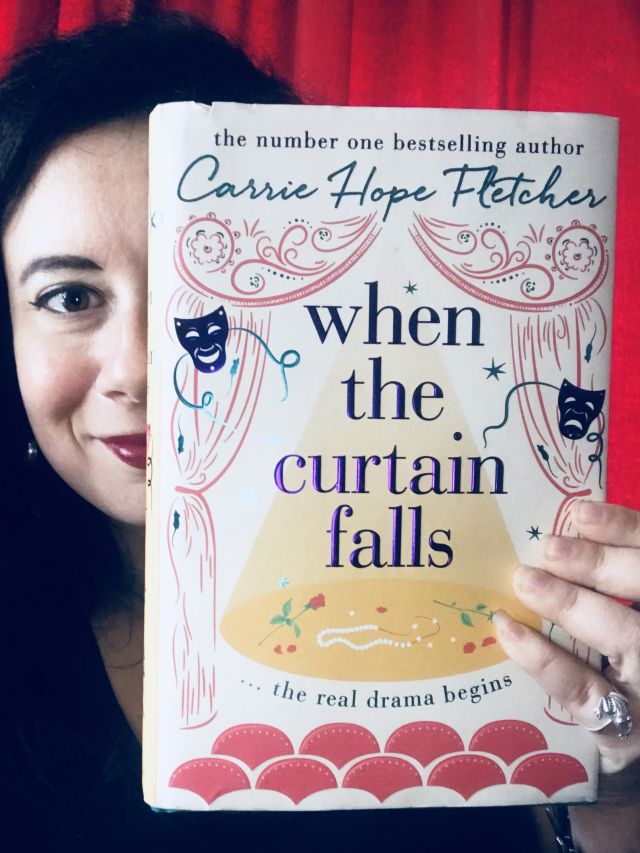From When The Curtain Falls by Carrie Hope Fletcher (Sphere 2018)


Theatres and ghost stories have both played starring roles in every era of my life and, as a result, of my writing. The idea of a ghost story set in a theatre immediately had me on its side – especially one written by a former west-end Eponine in Les Miserables which was another huge plus as far as my inner child was concerned. Carrie Hope Fletcher turned up on the theatrical, music and literary scenes long after my actual childhood but she certainly connects with a whole lot of it; I’m not surprised her emotional intelligence and courage to recognise and discuss her experiences and mistakes have made her “honorary big sister” to Youtubers all over the world.
Actress Fawn Burrows and apprentice doorman Walter Brown fall in love during a production of When the Curtain Falls, Fawn’s first starring role. But their producer is in love with, if not Fawn herself, then what being seen with Fawn will do for his career and ego. He’ll stop at nothing to take her away from the competition, in art and life. On opening night, Fawn is killed by an onstage bullet that was supposed to be fake. Almost seventy years later, TV star Oscar Bright is falling for his co-star, theatre newcomer Olive Green, playing Fawn’s role. But the flesh-and-blood ghosts in Oscar’s life, mainly his ex-girlfriend and her bitchy twitter feed, seem to Oscar enough reason to tell Olive he doesn’t want a proper relationship. Will Oscar lay his own ghosts to rest before they steal his future, or before the real ghosts of the theatre use Olive to make history repeat itself when the curtain falls?
Historical, theatrical horror fiction in cosy commercial colours, When the Curtain Falls ticks impressively disparate audience boxes. Olive and Oscar’s journeys into emotional adulthood, and the comparison between ghosts of ectoplasm and ghosts of our own unresolved emotions are strong and moving – at least, by the second half. What holds back the first half is “J.K. Rowling syndrome”: a certain level of sales is guaranteed because of the loyal, pre-existing worldwide fan base. Tight editing just doesn’t have to be the commercial necessity it is elsewhere. This lets down author and reader alike.
It’s not just literary fiction that requires writers to pull the statue that is the individual voice out of the mess of clay that is the clichés we live and think and draft in. Teenage fiction, horror fiction, commercial fiction, historical fiction, erotica – no matter the genre, the more true and specific the voice, the stronger the effect. The journey from honest but generalised human experience – i.e. clichéd phrases – to specifically voiced, individual human experience is one every writer (and their agent, and their publisher) need to take as far as they can. Fletcher’s characters and insights shine by the end but, had this been a play, some would have left at the interval. That makes me sad and angry for this book, but certainly not with it.
Described as “Moulin Rouge meets Phantom of the Opera”, When the Curtain Falls really does have them at heart, achieving that fear, fun, tension and mystery half way through with a sudden jump into specificity and confidence. The emergence of Fletcher’s emotional wisdom from the clay is worth the wait but the wait shouldn’t be there. If an editor believes in an author, they should be fully investing in helping that author realise their full potential, not sacrificing full voice for the gift of prior sales.
Rachel Knightley's short stories have previously won the ‘Promis' Prize for Children’s Fiction and first prize in Writers’ Forum’s fiction competition. 'Before I Walked Away' was published this month in Uncertainties III by Swan River Press. Her next short story, 'Duty of Care' will be published on 1 November. She is completing her PhD novel in 2019. Rachel's Green Ink Writers’ Gym workshops are resident at Waterstones Piccadilly, Sonny’s Kitchen and the Barbican Library. A former full-time copywriter and editor, she now teaches and edits from her bases in London W5 and SW15. Say hello or find out more at www.rachelknightley.com and www.greeninkwritersgym.com
Comments